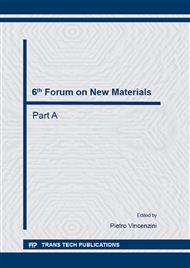[1]
H. Shokrollahi, K. Janghorban, Soft magnetic composite materials (SMCs) (review), J. Mater. Proc. Techn. 189 (2007) 1-12.
Google Scholar
[2]
B. Ślusarek, Powder magnetic materials, Przegl. Elektrot. 4 (2010), pp.16-19.
Google Scholar
[3]
P. Lemieux, R. Gurthie, M. Isac, Optimizing Soft Magnetic Composites for power frequency applications and power-trains, JOM 64 (2012) 374-387.
DOI: 10.1007/s11837-012-0262-z
Google Scholar
[4]
B. Ślusarek, B. Jankowski, K. Sokalski, J. Szczygłowski, Characteristics of power loss in soft magnetic composites a key for designing the best values of technological parameters, J. Alloy Compd. 581 (2013) 699-704.
DOI: 10.1016/j.jallcom.2013.07.084
Google Scholar
[5]
C. Cyr, Modélisation et caractérisation des matériaux magnétiques composites doux utilisés dans les machines électriques, PhD Thesis, Université Laval, Canada, (2007).
Google Scholar
[6]
L. Hultmann, O. Andersson, Advances in SMC technology – materials and applications, paper presented at EURO PM2009, Copenhagen, Denmark on 13. 10. (2009).
Google Scholar
[7]
R. Wojciechowski, C. Jędryczka, P. Łukasiewicz, D. Kapelski, Analysis of high speed permanent magnet motor with powder core material, COMPEL 31 (2012) 1528-1540.
DOI: 10.1108/03321641211248282
Google Scholar
[8]
H. Shokrollahi, K. Janghorban, The effect of compaction parameters and particle size on magnetic properties of iron-based alloys used in soft magnetic composites, Mater. Sci. Eng. 134 (2006) 41-43.
DOI: 10.1016/j.mseb.2006.07.015
Google Scholar
[9]
A. H. Taghvaei, H. Shokrollahi, M. Ghaffari, K. Janghorban, Influence of particle size and compaction pressure on the magnetic properties of iron-phenolic soft magnetic composites, J. Phys. Chem. Solid. 71 (2010) 7-11.
DOI: 10.1016/j.jpcs.2009.08.008
Google Scholar
[10]
W. Ding, R. Wu, Z. Xiu, G. Chen, J. Song, Y. Liao, G. Wu, W. Ding, Effect of iron particle size and volume fraction on the magnetic properties of Fe/silicate glass Soft Magnetic Composites, J. Supercond. Nov. Magn. 74 (2014) 435-441.
DOI: 10.1007/s10948-013-2281-6
Google Scholar
[11]
L. P. Lefebvre, S. Pelletier, C. Gelinas, Effect of electrical resistivity on core losses in soft magnetic iron powder materials, J. Magn. Magn. Mater. 176 (1997) L93-L96.
DOI: 10.1016/s0304-8853(97)01006-8
Google Scholar
[12]
T. Saito, S. Takemoto, T. Iriyama, Resistivity and core size dependencies of eddy current loss for Fe-Si compressed cores, IEEE Trans. Magn. 41 (2005) 3301-3303.
DOI: 10.1109/tmag.2005.854905
Google Scholar
[13]
G. Bertotti, General properties of power losses in soft magnetic materials, IEEE Trans. Magn. 24 (1988) 621-630.
DOI: 10.1109/20.43994
Google Scholar
[14]
G. Bertotti, I. D. Mayergoyz (Eds. ), The science of hysteresis, Elsevier, New York, (2005).
Google Scholar
[15]
P. Kollár, Z. Birčaková, J. Füzer, R. Bureš, M. Fáberova, Power loss separation in Fe-based composite materials, J. Magn. Magn. Mater. 327 (2013) 146-150.
DOI: 10.1016/j.jmmm.2012.09.055
Google Scholar
[16]
M. De Wulf, L. Anestiev, L. Dupré, L. Froyen, J. Melkebeek, Magnetic properties and loss separation in iron powder soft magnetic composite materials, J. Appl. Phys. 91 (2002) 7845-7847.
DOI: 10.1063/1.1446115
Google Scholar
[17]
A. H. Taghvaei, H. Shokrollahi, K. Janghorban, H. Abiri, Eddy current and total power loss separation in the iron–phosphate–polyepoxy soft magnetic composites, Mat. Des. 30 (2009) 3989-3995.
DOI: 10.1016/j.matdes.2009.05.026
Google Scholar
[18]
P. Kollár, Z. Birčaková, J. Füzer, J. Füzerová, R. Bureš, M. Fáberova, Wide frequency range AC magnetic properties of Fe-based composite materials, Acta Phys. Pol. A 118 (2010) 759-761.
DOI: 10.12693/aphyspola.118.759
Google Scholar
[19]
O. de la Barrière, C. Appino, F. Fiorillo, C. Ragusa, M. Lecrivain, L. Rocchino, H. Ben Ahmed, M. Gabsi, F. Malazeyrat, M. LoBue, Characterization and prediction of magnetic losses in Soft Magnetic Composites under distorted induction waveform, IEEE Trans. Magn. 49 (2012).
DOI: 10.1109/tmag.2012.2218614
Google Scholar
[20]
C. Appino, O. de la Barrière, F. Fiorillo, M. LoBue, C. Ragusa, Classical eddy current losses in soft magnetic composites, J. Appl. Phys. 113 (2013) 17A322 (3 pp. ).
DOI: 10.1063/1.4795744
Google Scholar
[21]
J. Barranger, Hysteresis and eddy current losses of a transformer lamination viewed as an application of the Poynting theorem, NASA Technical Note TN D-3114, Washington Nov. (1965).
Google Scholar
[22]
C. Appino, G. Bertotti, O. Bottauscio, F. Fiorillo, P. Tiberto, D. Binesti, J. P. Ducreaux, M. Chiampi, M. Repetto, Power losses in thick steel laminations with hysteresis, J. Appl. Phys. 79 (1996) 4575-4577.
DOI: 10.1063/1.361873
Google Scholar
[23]
M. De Wulf, L. Dupré, J. Melkebeek, Quasistatic measurements for hysteresis modeling, J. Appl. Phys. 87 (2000) 5239-5241.
DOI: 10.1063/1.373307
Google Scholar
[24]
H. Akçay, D. G. Ece, Modeling of hysteresis and power losses in transformer laminations, IEEE Trans. Power Deliv. 18 (2003) 487-492.
DOI: 10.1109/tpwrd.2003.809694
Google Scholar
[25]
K. Chwastek, AC loss density component in electrical steels, Phil. Mag. Lett. 90 (2010) 809-817.
Google Scholar
[26]
Y. Sakaki and S. Imagi, Relationship among eddy current loss, frequency, maximum flux density and a new parameter concerning the number of domain walls in polycrystalline and amorphous soft magnetic materials, IEEE Trans. Magn. 17 (1981).
DOI: 10.1109/tmag.1981.1061229
Google Scholar
[27]
F. de Leon, L. Qaseer, J. Cohen, AC power theory from Poynting theorem: identification of the power components of magnetic saturating and hysteretic circuits, IEEE Trans. Power Deliv. 27 (2012) 1548-1556.
DOI: 10.1109/tpwrd.2012.2188652
Google Scholar
[28]
Höganäs AB, Sweden, http: /www. hoganas. com.
Google Scholar
[29]
S. E. Zirka, Yu. I. Moroz, P. Marketos, A. J. Moses, Comparison of engineering methods of loss prediction in thin ferromagnetic laminations, J. Magn. Magn. Mater. 320 (2008) 2504-2508.
DOI: 10.1016/j.jmmm.2008.04.083
Google Scholar
[30]
A. Boglietti, A. Cavagnino, Iron loss prediction with PWM supply: an overview of proposed methods from an engineering point of view, Electr. Pow. Syst. Res. 80 (2010) 1211-1217.
DOI: 10.1016/j.epsr.2010.03.003
Google Scholar
[31]
J. Szczygłowski, P. Kopciuszewski, W. Wilczyński, A. Roman, Energy losses in Fe-based and Co-based amorphous materials, Mater. Sci. Eng. B 75 (2000) 13-16.
DOI: 10.1016/s0921-5107(00)00376-7
Google Scholar


